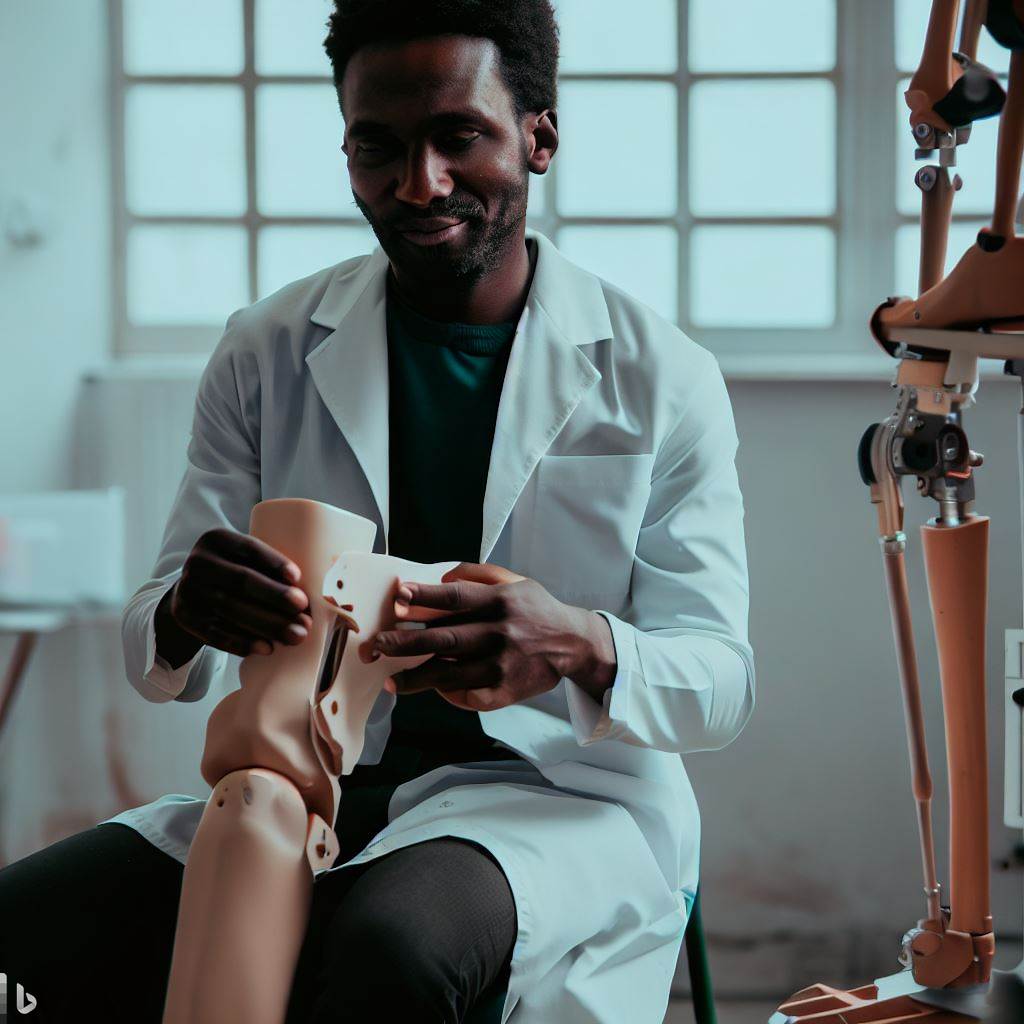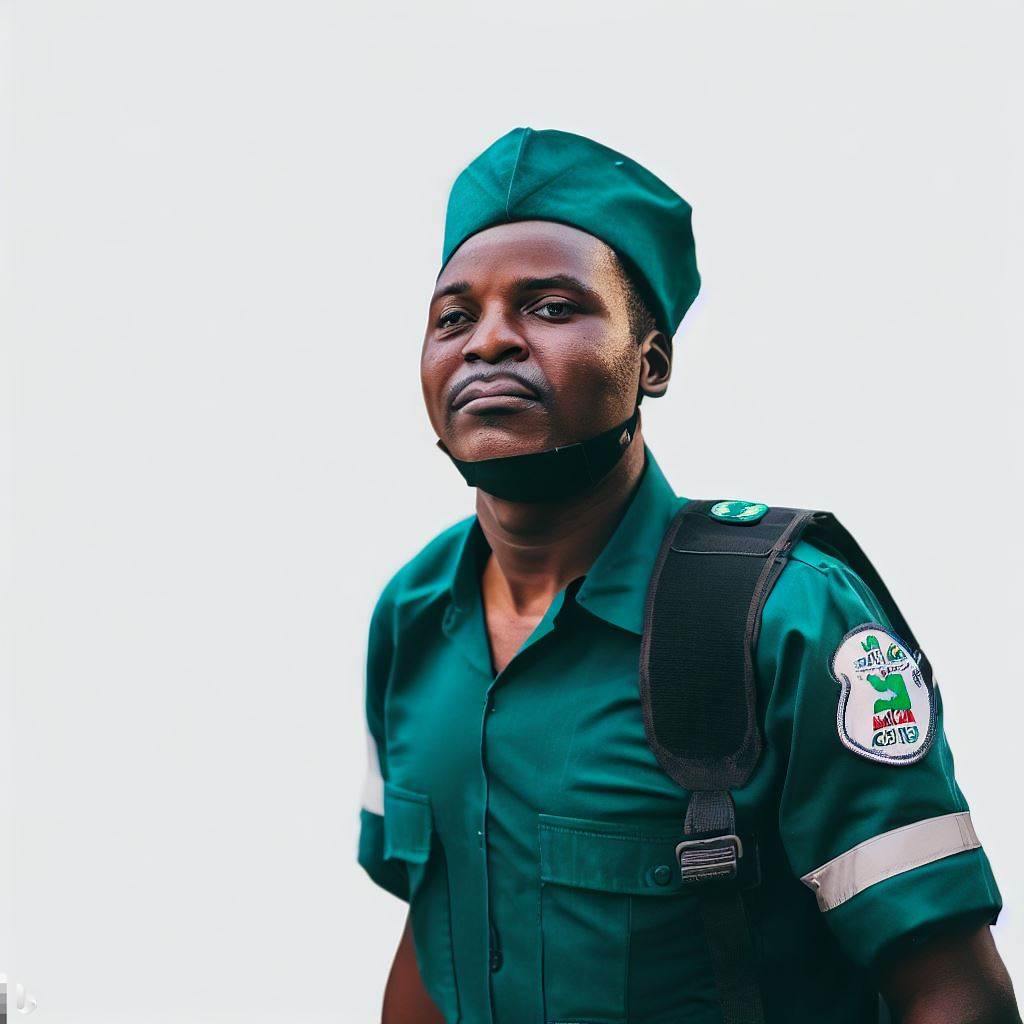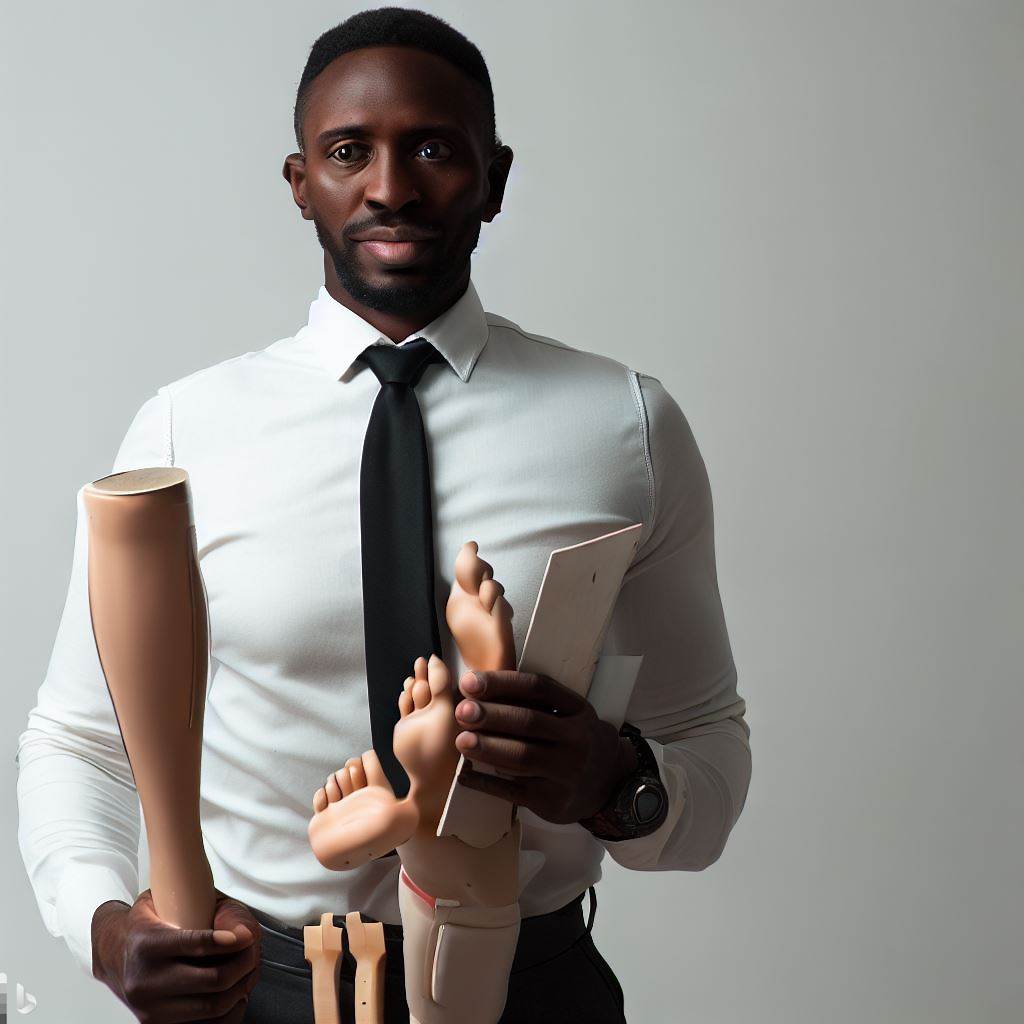Introduction
The role of orthotists and prosthetists in Nigeria is crucial for the healthcare system. Orthotists are professionals who design and fit orthotic devices such as braces and splints to support and improve the function of body parts affected by injury or disability.
Prosthetists, on the other hand, create and fit prosthetic limbs for individuals who have lost a limb.
Orthotists and prosthetists play an important role in the healthcare system as they help enhance the quality of life for individuals with disabilities.
Their expertise in designing and fitting orthotic and prosthetic devices ensures that patients can regain mobility and independence.
These professionals work closely with physicians, physical therapists, and other healthcare providers to assess patients’ needs and develop personalized treatment plans.
By utilizing their skills and knowledge, orthotists and prosthetists are able to improve patients’ functional abilities and enhance their overall well-being.
In Nigeria, where disability rates are high due to various factors such as accidents, diseases, and birth defects, the role of orthotists and prosthetists is even more critical.
They provide much-needed support and assistive devices to individuals who may otherwise struggle with mobility and daily activities.
Moreover, orthotists and prosthetists also contribute to the economic development of Nigeria. By enabling individuals with disabilities to be actively involved in society, they help create an inclusive and productive workforce.
Most importantly, orthotists and prosthetists in Nigeria play a vital role in the healthcare system by designing, fitting, and providing support to individuals with disabilities.
Their expertise ensures that patients can regain function and improve their overall quality of life.
History of Orthotics and Prosthetics in Nigeria
Orthotics and Prosthetics, the field concerned with designing and fitting assistive devices for individuals with physical impairments, has a rich history in Nigeria.
- Introduction: The development and evolution of Orthotics and Prosthetics in Nigeria has been a significant journey.
- Early Beginnings: The field started to gain recognition in the 1960s when the healthcare system in Nigeria was at an early stage.
- Foreign Influence: Initially, Orthotics and Prosthetics in Nigeria heavily relied on foreign assistance and expertise.
- Collaboration with International Organizations: Institutions like the World Health Organization and NGOs played a vital role in the early development of Orthotics and Prosthetics in Nigeria.
- Local Training and Education: As the field progressed, efforts were made to establish local training programs for Orthotists and Prosthetists.
- Local Manufacturing: In the 1980s, Nigeria started to produce orthotic and prosthetic devices locally, reducing dependency on imports.
- Establishment of Professional Bodies: The Nigerian Association of Orthotists and Prosthetists (NAOP) was founded in 1996 to promote the field’s growth and development.
- Collaborations with Universities: Nigerian universities began offering degree programs specific to Orthotics and Prosthetics, fostering local expertise.
Overview of the Development and Evolution of the Field in Nigeria
The field of Orthotics and Prosthetics in Nigeria has evolved significantly over the years.
- Improved Access to Care: Accessibility to orthotic and prosthetic services has improved, reaching more individuals in need.
- Technological Advancements: With the advent of technology, the design and production of orthotic and prosthetic devices have seen significant advancements.
- Multidisciplinary Approach: Collaboration between Orthotists and Prosthetists, physiotherapists, and other healthcare professionals has become more prevalent.
- Customization and Personalization: Orthotic and prosthetic devices are now tailored to individual needs, ensuring maximum comfort and effectiveness.
- Awareness and Advocacy: Efforts have been made to raise awareness about Orthotics and Prosthetics in Nigeria, advocating for better support and inclusion for individuals with physical impairments.
Challenges Faced in the Past
The field of Orthotics and Prosthetics in Nigeria has encountered various challenges throughout its history.
- Limited Funding: Insufficient financial support has hindered the growth and expansion of Orthotics and Prosthetics in Nigeria.
- Lack of Public Awareness: Many individuals with physical impairments remain unaware of the potential benefits of orthotic and prosthetic devices.
- Limited Availability: In the past, access to orthotic and prosthetic services was limited, especially in rural areas.
- Import Dependency: Nigeria relied heavily on imported orthotic and prosthetic devices, making them less affordable and accessible to the general population.
- Lack of Standardization: The absence of standardized practices and regulations posed challenges to the quality and consistency of orthotic and prosthetic services.
- Infrastructure and Resources: Insufficient infrastructure and resources, such as well-equipped laboratories and training facilities, affected the field’s development.
- Professional Recognition: Initially, Orthotists and Prosthetists faced challenges in gaining recognition and acceptance as healthcare professionals.
- Cultural Stigma: Cultural beliefs and stigma associated with disability posed additional hurdles to the acceptance and utilization of orthotic and prosthetic devices.
In the end, the history of Orthotics and Prosthetics in Nigeria showcases a journey filled with progress, challenges, and promising developments.
Despite the obstacles faced, the field has evolved to provide improved access, customization, and awareness.
Continued efforts in funding, awareness, standardization, and infrastructure will further strengthen the role of Orthotists and Prosthetists in Nigeria’s healthcare system.
Read: The Journey to Becoming a Registered Nurse in Nigeria
Current State of Orthotics and Prosthetics in Nigeria
The Role of Orthotists and Prosthetists in Nigeria is crucial for meeting the needs of individuals requiring specialized services.
However, the current situation is concerning, as the country has a low number of qualified professionals, with only about five orthotists and prosthetists per one million people, far below the recommended ratio by the World Health Organization.
This scarcity can be attributed to limited opportunities for training and education in the field, as few institutions in Nigeria offer formal programs for orthotics and prosthetics.
Additionally, the availability of dedicated healthcare facilities for these services is also limited, further hindering access to appropriate care.
Consequently, individuals in need of orthotics and prosthetics face significant challenges, affecting their mobility, independence, and overall quality of life.
To address this issue, increased investment in training and education for orthotists and prosthetists is essential. Establishing more training programs and offering scholarships to aspiring professionals could help alleviate the shortage.
Moreover, the government and stakeholders should prioritize the inclusion of orthotics and prosthetics services in healthcare facilities across the country through policy changes and incentives.
By increasing the number of qualified professionals and improving the availability of specialized services, Nigeria can better meet the needs of its population, allowing individuals to access appropriate care and regain their independence and quality of life.
Read: Working Conditions of Medical Lab Technicians in Nigeria
Education and Training for Orthotists and Prosthetists
Orthotists and Prosthetists play a crucial role in providing quality care and improving the lives of individuals in Nigeria.
To become a professional in this field, it is essential to undergo proper education and training.
Here, we will discuss the educational pathways for aspiring Orthotists and Prosthetists, highlighting the significance of comprehensive training for delivering effective care.
Education and Training Pathways
- Undergraduate Degree: The journey to becoming an Orthotist or Prosthetist in Nigeria typically starts with obtaining a bachelor’s degree in a related field, such as orthotics and prosthetics, biomechanics, or rehabilitation sciences.
- Postgraduate Studies: After completing the undergraduate degree, individuals interested in pursuing a career as Orthotists and Prosthetists can opt for postgraduate studies.
This advanced education helps in gaining specialized knowledge and skills required for the field. - Professional Certification: In addition to formal education, obtaining professional certifications is mandatory for Orthotists and Prosthetists in Nigeria.
One such certification is the Orthotics and Prosthetics Society of Nigeria (OPSN) certification, which validates the competence and expertise of professionals in this field.
The Importance of Proper Training:
Proper training is vital for Orthotists and Prosthetists as it ensures the delivery of quality care to patients.
Here’s why:
- Expertise in Patient Assessment: Comprehensive training equips Orthotists and Prosthetists with the knowledge and skills to accurately assess the needs and conditions of patients. This allows them to provide tailored and effective treatment plans.
- Proficiency in Fabrication and Fitting: With appropriate training, professionals gain expertise in fabricating and fitting orthotic and prosthetic devices. This ensures precise customization and comfortable usage for patients.
- Stay Updated with Advancements: Training programs keep Orthotists and Prosthetists updated with the latest advancements and techniques in the field.
This enables them to incorporate innovative and improved practices into their treatment approaches. - Collaborative Care: Proper training emphasizes the significance of teamwork and collaboration with other healthcare providers.
By working alongside physicians, physical therapists, and other professionals, Orthotists and Prosthetists can deliver holistic care to patients. - Addressing Complex Cases: Advanced training equips Orthotists and Prosthetists to handle complex cases effectively. They are trained to analyze intricate conditions and develop appropriate solutions for patients with intricate needs.
In a nutshell, education and training are fundamental for individuals pursuing a career as Orthotists and Prosthetists in Nigeria.
The combination of proper education, postgraduate studies, and professional certifications prepares professionals to provide comprehensive and quality care to patients.
Through accurate assessment, proficient device fabrication, collaboration, and continuous learning, Orthotists and Prosthetists play a critical role in improving the lives of individuals in need of orthotic and prosthetic interventions.
Read: Nigeria’s O&P Work Environment: What to Expect

Services Provided by Orthotists and Prosthetists in Nigeria
Orthotists and prosthetists in Nigeria play a crucial role in enhancing the lives of individuals with diverse conditions and disabilities.
These professionals are extensively trained to assess, design, and fit orthotic and prosthetic devices, offering a range of valuable services to those in need.
Orthotic devices are customized to support, align, correct abnormalities, and improve functionality. They include braces, splints, shoe inserts, and corrective helmets.
Prosthetic devices, on the other hand, are designed to replace missing limbs, hands, feet, and even facial features, restoring mobility and independence.
The role of orthotists and prosthetists is pivotal in addressing various conditions.
For instance, individuals with cerebral palsy, a neurological disorder affecting muscle coordination, can benefit from orthotic devices that manage spasticity, improve gait, and enhance posture.
Similarly, orthotists and prosthetists offer support to those with scoliosis, a condition characterized by a lateral curvature of the spine.
Custom orthotic braces can help support the spine and prevent further progression of the curvature, alleviating pain and physical deformity.
One of their significant contributions lies in assisting amputees, whether due to accidents or medical conditions.
Through custom-made prosthetic limbs, these individuals can regain mobility and function, tailored precisely to fit their residual limbs and meet their unique needs and goals.
Beyond providing customized devices, these professionals offer counseling, rehabilitation, and educational support.
They guide patients on device usage, maintenance, and proper care, helping them adapt to their new devices and regain confidence.
Collaboration with other healthcare experts, such as physiotherapists, occupational therapists, and orthopedic surgeons, is an essential aspect of their role.
This multidisciplinary approach ensures comprehensive care, maximizing the potential benefits of orthotic and prosthetic interventions.
In fact, orthotists and prosthetists are invaluable members of the healthcare system in Nigeria.
Through their expertise, they provide personalized devices and support that significantly improve the quality of life, mobility, and independence of individuals facing various conditions and disabilities.
Read: Current Opportunities for Medical Lab Technicians in Nigeria
Challenges Faced by Orthotists and Prosthetists in Nigeria
Orthotists and prosthetists in Nigeria face several challenges in their profession.
These challenges hinder their ability to provide adequate care and assistance to those in need.
Lack of adequate funding and resources
Orthotists and prosthetists in Nigeria often struggle with a lack of funding and resources. This prevents them from accessing the necessary materials and equipment to provide quality care to their patients.
Limited awareness and understanding among the public
One of the major challenges faced by orthotists and prosthetists in Nigeria is the limited awareness and understanding among the public.
This leads to misconceptions and stigmatization, making it difficult for these professionals to gain recognition and support.
Insufficient training and education opportunities
Orthotists and prosthetists in Nigeria face challenges in accessing adequate training and education opportunities. This results in a shortage of skilled professionals who can provide the necessary care and support to those in need.
Inadequate healthcare infrastructure
Another challenge faced by orthotists and prosthetists in Nigeria is the inadequate healthcare infrastructure.
This includes a lack of specialized facilities and clinics where these professionals can work effectively and efficiently.
Limited collaboration and networking opportunities
Orthotists and prosthetists in Nigeria struggle with limited collaboration and networking opportunities. This prevents them from sharing knowledge and experiences with their peers, hindering professional growth and development.
Cultural and societal barriers
Orthotists and prosthetists in Nigeria also face cultural and societal barriers in their work.
This includes beliefs and attitudes that may discourage individuals from seeking orthotic and prosthetic care, further perpetuating the lack of awareness and understanding.
Lack of government support and policies
The absence of adequate government support and policies is a significant challenge for orthotists and prosthetists in Nigeria.
Without proper regulations and funding, these professionals face difficulties in providing comprehensive care to their patients.
Limited access to advanced technology and innovation
Orthotists and prosthetists in Nigeria often struggle to access advanced technology and innovation in their field. This hampers their ability to provide the latest and most effective orthotic and prosthetic solutions to their patients.
High cost of orthotic and prosthetic devices
The high cost of orthotic and prosthetic devices poses a significant challenge for both orthotists and prosthetists in Nigeria and their patients.
This makes it difficult for individuals to afford the essential assistive devices they require.
Lack of standardized guidelines and protocols
Orthotists and prosthetists in Nigeria face challenges due to the absence of standardized guidelines and protocols in their practice.
This leads to inconsistencies in patient care and hampers the overall effectiveness of their work.
Generally, orthotists and prosthetists in Nigeria encounter various challenges that impede their ability to provide effective care.
These challenges include a lack of funding and resources, limited public awareness and understanding, insufficient training opportunities, inadequate healthcare infrastructure, cultural and societal barriers, lack of government support and policies, limited access to advanced technology, high device costs, and the absence of standardized guidelines.
Addressing these challenges is essential in improving the quality of orthotic and prosthetic care in Nigeria.
Read: Orthotic and Prosthetic Jobs in Nigeria: Scope & Pay
Initiatives and Solutions
Introduction of initiatives aimed at improving the field
- Establishment of specialized training programs for orthotists and prosthetists to ensure quality education.
- Collaboration with international organizations to bring in advanced technology and knowledge.
- Creation of professional associations to foster networking and knowledge-sharing among orthotists and prosthetists.
- Implementation of research initiatives to enhance evidence-based practice in the field.
- Formation of public awareness campaigns to educate the general population about the importance of orthotics and prosthetics.
Discussion of potential solutions to the challenges faced
- Addressing the lack of funding by lobbying the government and seeking private sector support.
- Improving accessibility to orthotic and prosthetic services by establishing more clinics and centers across Nigeria.
- Enhancing the training and skill development of orthotists and prosthetists to meet the evolving needs of patients.
- Developing standardized guidelines and protocols for orthotic and prosthetic treatments to ensure consistency and quality.
- Advocating for policy changes that prioritize the importance of orthotics and prosthetics in healthcare.
In general, the role of orthotists and prosthetists in Nigeria can be further strengthened through various initiatives and solutions.
By introducing specialized training programs, collaborating with international organizations, establishing professional associations, implementing research initiatives, and conducting public awareness campaigns, the field can experience significant growth.
Additionally, addressing challenges such as lack of funding, improving accessibility to services, enhancing training, developing guidelines, and advocating for policy changes can contribute to the overall development and improvement of orthotics and prosthetics in Nigeria.
Read: How to Become a Diagnostic Medical Sonographer in Nigeria
Impact on Patients and Society
Orthotists and prosthetists play a crucial role in Nigeria, impacting patients and society in various ways.
Their expertise in providing orthotics and prosthetics has transformed the lives of many individuals, inspiring hope and enabling them to live fulfilling lives.
Impact on Patients
Patients who have benefited from orthotics and prosthetics have powerful stories to share.
These patients often experienced severe physical disabilities or limb loss before receiving appropriate devices.
With the help of orthotists and prosthetists, these individuals regained mobility and independence.
They can walk again, participate in activities they love, and engage in daily tasks without hindrance.
Orthotics and prosthetics have provided a lifeline to patients, restoring their confidence and self-esteem.
These success stories inspire others facing similar challenges and give them hope for a brighter future.
Publish Your Professional Profile, Business or Brand
Showcase your expertise, gain trust, and boost visibility instantly on Professions.ng.
Publish NowImpact on Society
The overall impact of orthotists and prosthetists extends far beyond individual patients.
By enabling people to regain their mobility and independence, the burden on their families and caregivers is significantly reduced.
Patients who can move freely can pursue education, employment, and contribute actively to society.
The societal stigma associated with physical disabilities is challenged and diminished through the success stories of orthotic and prosthetic users.
Employers and policymakers are witnessing firsthand the capabilities and potential of individuals with disabilities.
This recognition leads to the promotion of inclusive policies, creating a more accessible and inclusive society.
Orthotists and prosthetists also contribute to the economy by providing custom-made devices and creating employment opportunities.
The industry’s growth and advancements fuel research and innovation, benefiting not only Nigeria but the global medical community.
Therefore, orthotists and prosthetists have a profound impact on patients and society in Nigeria.
Through the testimonies of patients who have benefited from orthotics and prosthetics, we see the transformative power of these devices in restoring mobility and independence.
Moreover, the overall impact on society includes reducing the burden on caregivers, challenging societal stigmas, promoting inclusivity, and contributing to economic growth.
Nigeria is witnessing the positive ripple effects of the vital work done by orthotists and prosthetists, ensuring a brighter future for individuals with disabilities.
Conclusion
In short, orthotists and prosthetists play a crucial role in Nigeria’s healthcare system. They design, fit, and maintain orthopedic devices that improve the mobility and quality of life for individuals with disabilities.
Their expertise is needed to address the high prevalence of limb loss and musculoskeletal conditions in the country.
This blog post has highlighted the immense impact orthotists and prosthetists have in Nigeria by providing personalized and effective solutions for patients.
Additionally, their contribution to rehabilitation services and assisting individuals in achieving independence cannot be overstated.
It is essential for the Nigerian government, healthcare institutions, and society as a whole to recognize the significance of orthotists and prosthetists.
Increased support, funding, and training programs should be implemented to enhance their capacity and expand access to their services.
Call to Action
Let us advocate for the increased support and recognition of orthotists and prosthetists in Nigeria.
By investing in their profession, we ensure that individuals with disabilities receive the best possible care and solutions.
Furthermore, raising public awareness about the role of orthotists and prosthetists will help combat stigma and promote inclusivity.
Together, we can create a society that values the importance of mobility and independence for all its members.




